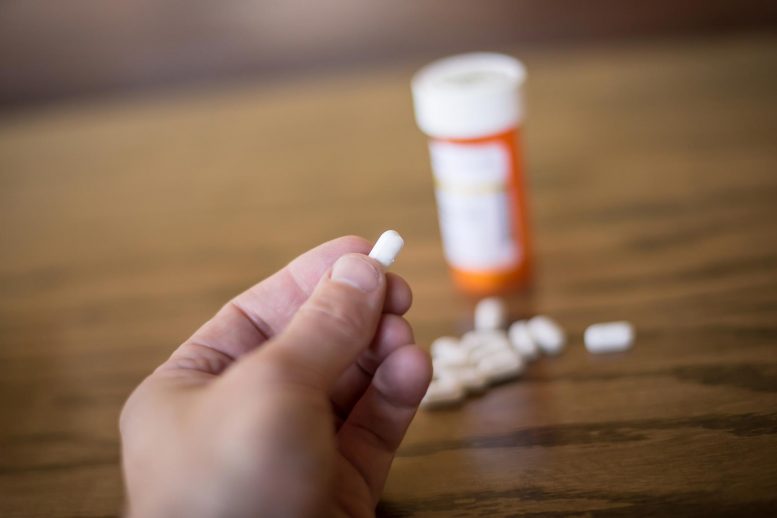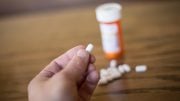
A landmark clinical trial tested a program that incorporated combined one-to-one and group support sessions. It found that one in five individuals were able to discontinue their use of opioids without experiencing an increase in their pain levels after one year. This new treatment option is seen as an alternative to opioid use and holds the potential to significantly improve the quality of life for patients, according to experts.
Scientists from the University of Warwick and The James Cook University Hospital in Middlesbrough have led a clinical study, financed by the National Institute for Health and Care Research (NIHR), on a new treatment that could aid individuals in discontinuing their reliance on opioid painkillers for chronic pain management.
Prescription opioids are currently used by over 1 million people in the UK, with more than 50,000 of these individuals having used these drugs for half a year or longer. This imposes a substantial financial burden on the NHS, with estimated annual costs reaching up to £500 million.
Recent NHS initiatives have managed to reduce opioid prescribing by eight percent, saving an estimated 350 lives.
New research has found evidence that could help many more people stop their opioid painkiller use.
Despite the evidence that taking opioids long-term is harmful, there are currently no alternative treatments available to safely help people who are coming off opioids and still dealing with chronic, non-cancer pain.
A team of researchers and clinicians have developed and successfully trialed an intervention program designed to guide people in coming off prescription painkillers, taper their opioid intake, and learn how to manage their pain using alternative techniques with a course that combines one-to-one and group support.
1 in 5 people came off opioids within one year
The study, titled I-WOTCH (Improving the Wellbeing of People with Opioid Treated Chronic Pain), found that the intervention program helped 1 in 5 people come off their opioids within one year, without substituting medication and without making their pain worse.
Over 600 people took part in the randomized controlled study between 2017 and 2020 who at the beginning of the trial had been regularly taking strong opioids for at least three months. The participants were recruited from GP practices from the North East of England and the Midlands.
The study compared two treatments, dividing participants randomly into two groups. One group had access to their existing GP care, plus a self-help booklet and relaxation CD; the second group had the same and also took part in an intervention program specially developed by the study team.
The intervention program included sessions on coping techniques, stress management, goal setting, mindfulness, posture and movement advice, how to manage any withdrawal symptoms, and pain control after opioids.
Participants completed questionnaires about their everyday functioning and painkiller intake at intervals throughout the trial.
After one year, 29 percent of people who took part in the intervention program, were able to fully come off their opioids completely, compared to just 7 percent who were treated with existing GP care, the self-help booklet, and CD.
There was no difference between the two groups in terms of their pain, or how pain interfered with their lives.
Combined group and one-to-one support key to reducing opioid need
Harbinder Kaur Sandhu, Professor of Health Psychology at the University of Warwick, who led the clinical trial said: “Structured, group-based, psycho-educational self-management interventions help people to better manage their daily lives with a long-term condition, including persistent pain, but few of these have specifically targeted patients considering opioid withdrawal.
“The findings from the trial are extremely promising. Many people who have been taking prescription painkillers over a long period of time suffer from harmful side effects but can feel reluctant to come off them because they think it could make their pain worse, or they do not know how to approach this with their clinician.
“Our trial has found a treatment that could help people to come off opioids, in a way that is safe, supportive, and gradual. It’s a supported decision between the patient and the clinician, and not forced tapering. The program helps people to learn alternative ways to manage their pain and help overcome challenges of withdrawal and has the potential to give people an overall better quality of life.”
Opioids have little long-term impact on chronic pain
Professor Sam Eldabe, clinical trial co-lead and consultant in pain medicine at The James Cook University Hospital, said: “Our trial is the culmination of six years of work during which we learned that the harms from long-term opioids extend beyond the individual into their social circle. Patients taking opioids lose interest in social interaction with family and friends and gradually withdraw from society into an opioid-induced mental fog.
“Despite appreciating the social impact of the drugs, most patients utterly dread a worsening of their pain should they attempt to reduce their opioids.
“Our study shows clearly that opioids can be gradually reduced and stopped with no actual worsening of the pain. This confirms our suspicions that opioids have very little long-term impact on persistent pain.”
Colin’s story
Colin Tysall, 81 from Coventry, was prescribed painkillers, including opioids to treat chronic back pain, as a result of working as an aircraft radiologist for 30 years.
“I was an industrial radiologist and wore my back out x-raying aircraft parts and handling heavy castings for jet engines. The castings could weigh up to 200lbs and even though we would move some of the castings around in stillages, it was still a strain. We were having to move these castings around very carefully, with no lifting equipment.”
Colin started experiencing sciatic pain down both of his legs and found that he had three slipped discs in his back. He describes the devastating impact of painkiller dependency:
“The treatment at the time was bed rest and painkillers. The tablets got stronger and stronger until eventually I was prescribed opioids,” said Colin.
“I spent so much time in bed that I lost the use of my legs and fell into a deep depression, so I was prescribed antidepressants too. I couldn’t look after my family, and at one point I tried to take my own life.
“I didn’t like being on tablets. They addled my brain, they made it difficult to think straight, my brain wasn’t functioning as it should. I would have nightmares a lot. As soon as I could come off them, I did.”
After spending 10 years visiting a hospital to treat his back and mental health, Colin turned to alternative treatments to treat his pain.
“I found that the best treatment for me was exercise. I got involved with mental health self-health groups, and I became friends with people experiencing similar problems. We would walk and talk together, which was the opposite of the guidelines at the time, but I found it helped keep my mind off the pain, and it made it easier to cope.”
After spending a couple of years tapering his medication to a lower level, Colin was eventually able to come off the tablets altogether. Recently he has found that he is no longer suffering from the pain.
Colin retrained as an associate mental health manager, and he continues to work at Coventry and Warwick universities helping to train psychiatric and nursing students.
Most recently, Colin got involved with the University of Warwick’s Clinical Trials Unit and has been helping support patients in the I-WOTCH clinical trial group support sessions as a trained I-WOTCH layperson.
The full intervention program consisted of an 8-to-10-week course and included:
- Group support sessions
The group sessions consisted of three full-day sessions per week. The group sessions included education about opioids and pain, case studies of people who have successfully tapered, learning self-management skills for pain, and challenging beliefs. There was also the opportunity to practice techniques such as mindfulness and distraction. The group sessions were facilitated by a trained I-WOTCH nurse and a trained I-WOTCH layperson (someone who had personal experience with pain and opioid tapering).
- Tailored one-to-one support and opioid tapering
In addition to the group sessions, people in the study were also given one-to-one sessions with the nurse to offer support and most importantly tailored advice for the opioid tapering which was delivered face-to-face and through telephone calls. A tapering app designed for the study was used to calculate a reduction in opioid intake based on current guidance at that time and actioned by the participants’ GPs.
Reference: “Reducing Opioid Use for Chronic Pain With a Group-Based Intervention” by Harbinder K. Sandhu, Katie Booth, Andrea D. Furlan, Jane Shaw, Dawn Carnes, Stephanie J. C. Taylor, Charles Abraham, Sharisse Alleyne, Shyam Balasubramanian, Lauren Betteley, Kirstie L. Haywood, Cynthia P. Iglesias-Urrutia, Sheeja Krishnan, Ranjit Lall, Andrea Manca, Dipesh Mistry, Sian Newton, Jennifer Noyes, Vivien Nichols, Emma Padfield, Anisur Rahman, Kate Seers, Nicole K. Y. Tang, Colin Tysall, Sam Eldabe and Martin Underwood, 23/30 May 2023, JAMA.
DOI: 10.1001/jama.2023.6454







One in five is not a good success rate, especially in a study that wasn’t double-blind, meaning that a good percentage of the patients would have been trying to downplay their pain to please the researchers. That also means that a minimum of 4 out of 5 patients were merely taught to unnecessarily suffer in silence from increased pain levels.
The depiction of the effects of opioids in this article are also scaremongering propaganda right up there with “Reefer Madness.” Pain medication given at the correct dose for the patient’s body mass and pain levels can have a temporary mild sedating effect on the person while their body adjusts — but being tired/sleepy all the time, social withdrawal, and depression are symptoms of the untreated/undertreated pain, not the medication used to control it.
If the researchers were proclaiming that a parallel “new treatment” helped gay people marry the opposite sex and stop having same-sex relationships, would you just as breathlessly report it as a success? Or would you accurately recognize that it was conversion therapy that did nothing more than pressure them to hide their orientation and suffer the results in silence as long as they could?
So 80% failed to get off opiods. Good job! Better than the 85% who would have failed otherwise.
This is just not good medicine. Tryy again.
The physical withdrawal is very difficult,I broke my neck two times, addicted to all opioid meds at one time or another.fentAnyl, morphine methadone’s bad strong etc as I was saying physical is usually agonizing however week,ten it’s pau over.its the psychological withdrawal I found that kept bringing me back to opioids.i did a 2 year program for my father in Hawaii stayed clean the entire time In this program,broke it the second time was so afraid of the opioids however I never used while in 2 Year program? So obviously I learned ways to handle chronic pain .it’s never left me and opioids zis a bandaid. However we t back,2yerad again,worked there 4 years . I’m clean that’s what we do ,we relapse it doesn’t mean you must stay down .this experience humbled me ,I asked for help ,I was in chronic pain legitimately however the addiction made me different ,cocky etc. Get off,ask for help or don’t must make the decision yourself,do you really want to get and stay clean. I didn’t for a long time thought I just can’t handle this neverending pain.u can ,I do,I’m clean. ,no meetings go if they help.but u can stay clean if I do you can aloha godspeed my spiritual life book the cravings for painkillers heroin etc gone .I get sick thinking of my last 2 week withdrawal from methadone.you can too. If u relapset get up and move in. I work in the field
Sorry for spelling errors I’m passionate about opioid addiction ,any addiction if u need help email me Sheri